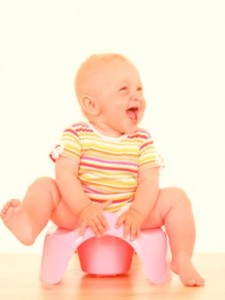Diarrhea in babies can be difficult to distinguish. Mothers who breastfeed their babies will notice that the stool of their infants normally appears soft. When babies start to eat solid foods, their stool becomes a little bit firmer. Sometimes babies would defecate and their stool may appear loose. There is nothing to be concerned if the baby’s stool may be a little looser than what it normally appears but if baby starts to have bowel movements more frequently than usual and if the stool appears more watery, this could indicate that the child has diarrhea.
Causes of Diarrhea in Babies (Teething and other reasons)
Diarrhea in babies has several causes. Viral infection such as rotavirus, influenza and astrovirus, and bacterial infection such as campylobacter, salmonella and shigella can cause diarrhea. Sugar, excess juice or sweet drinks can cause stomach upset and will lead to diarrhea. Babies also may have food allergies such as protein in cow’s milk. Other reasons for diarrhea in children are parasitic infections, ear infections and poisoning.
As a new parent, you may speculate if the baby has diarrhea, it may be a sign of teething. This can be a possibility because a teething baby produces more saliva which makes them pass motions quickly.

If your baby has green diarrhea, it is usually due the food being digested very quickly and is not able to turn to the brown color we are familiar with. Read more about bowel movement colors and their meaning . When you contact the paediatrician regarding diarrhea in babies, do let him or her know if the baby passes green stool.
Treatment of Diarrhea in Babies
Diarrhea in babies is less threatening and do not pose great harm to their health if they are treated properly. But a severe case of diarrhea can make babies dehydrated. This loss of fluids in the body can be dangerous. Dehydration develops rapidly within a few hours and if the baby is not provided with fluids, he or she will succumb to dehydration. If the baby is vomiting continuously and has diarrhea, there is a great risk of dehydration. In cases like this, the baby should be taken to a hospital as soon as possible. Symptoms such as sunken eyes, dry mouth, no urination for more than 4 hours, and the baby appearing lethargic or may be unconscious indicate dehydration. To avoid such undue circumstance, the primary concern when babies have diarrhea is to keep them hydrated by giving enough liquids as well as providing them with breast milk. It is very important to seek advice from a doctor especially when the baby is only 3 months old and is suffering from diarrhea. Mothers should bring their children to see the doctor if there is blood or pus in the stool, fever is present, if the diarrhea has gone on for more than 3 days, and if there is continuous vomiting for more than 24 hours.
Foods That Babies Need To Eat and Avoid When They Have Diarrhea
Mothers who nurse their babies who have diarrhea should give lots of liquids and provide them small meals that can eventually help resolve the diarrhea. Some of these foods are banana, rice, applesauce and toast. This is called the BRAT diet which will make the stool harder. These foods help restore nutrients and fight infection. Yogurt is also good for babies who have diarrhea as long as it contains lactobacillus. Do not provide sweetened fluids such as soda, undiluted fruit juices, sugar water and dairy products with the exception of yogurt.
Care for Babies Who have Diarrhea
When babies are suffering from diarrhea, mothers should do the best they can to comfort and cuddle their babies during the course of the illness. Mothers should be as healthy as possible since they are the ones who nourish their babies. Diarrhea in babies can be treated effectively as long as their mothers provide them with lots of proper care and attention.